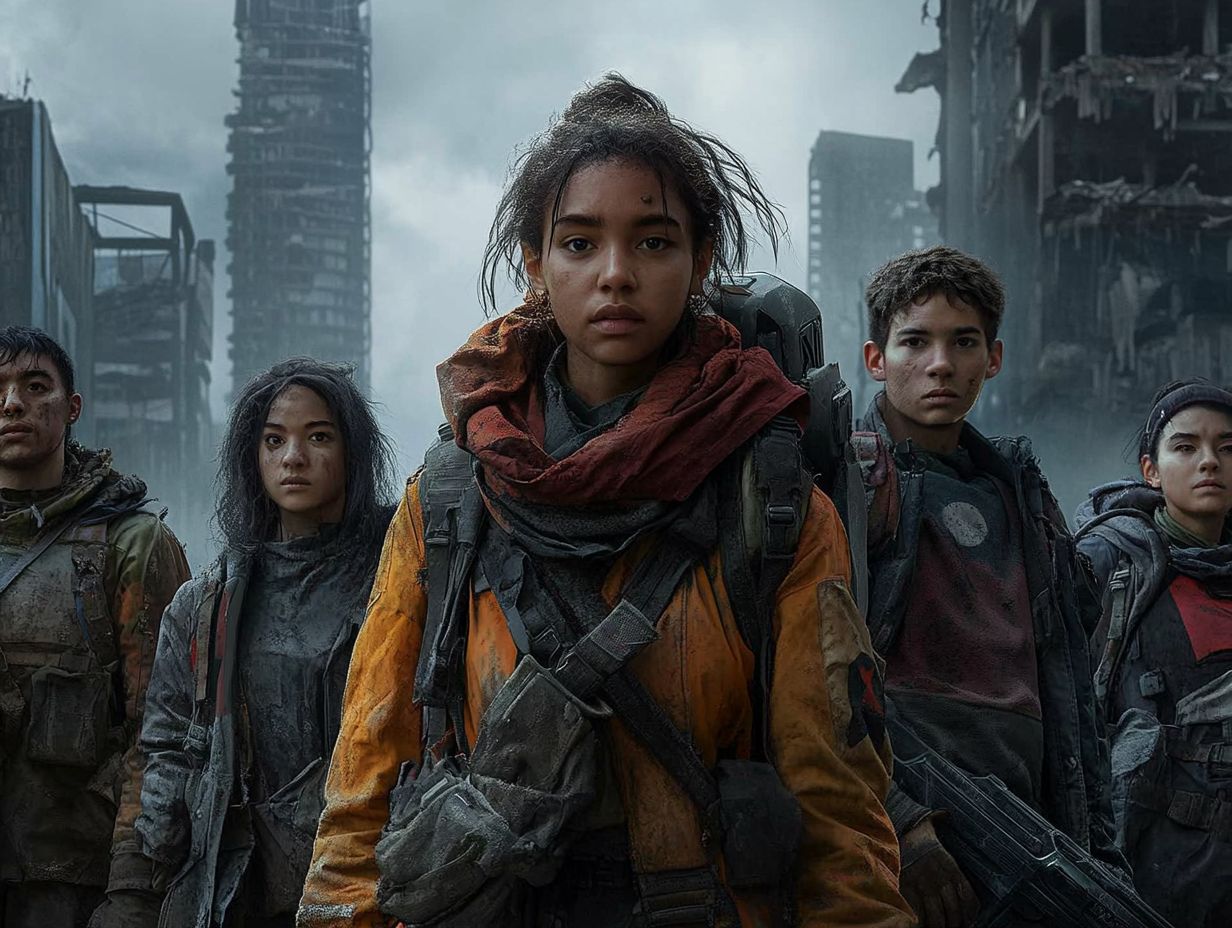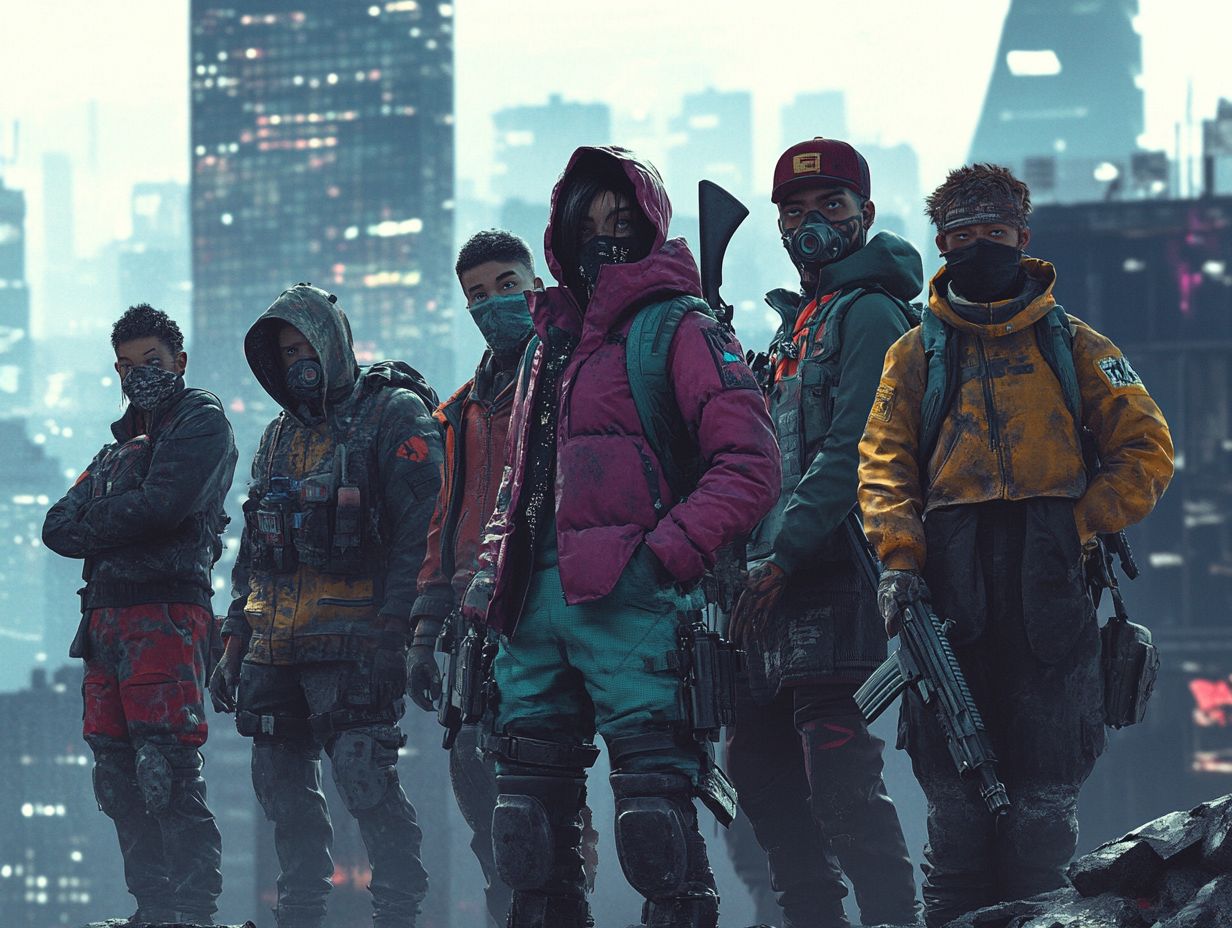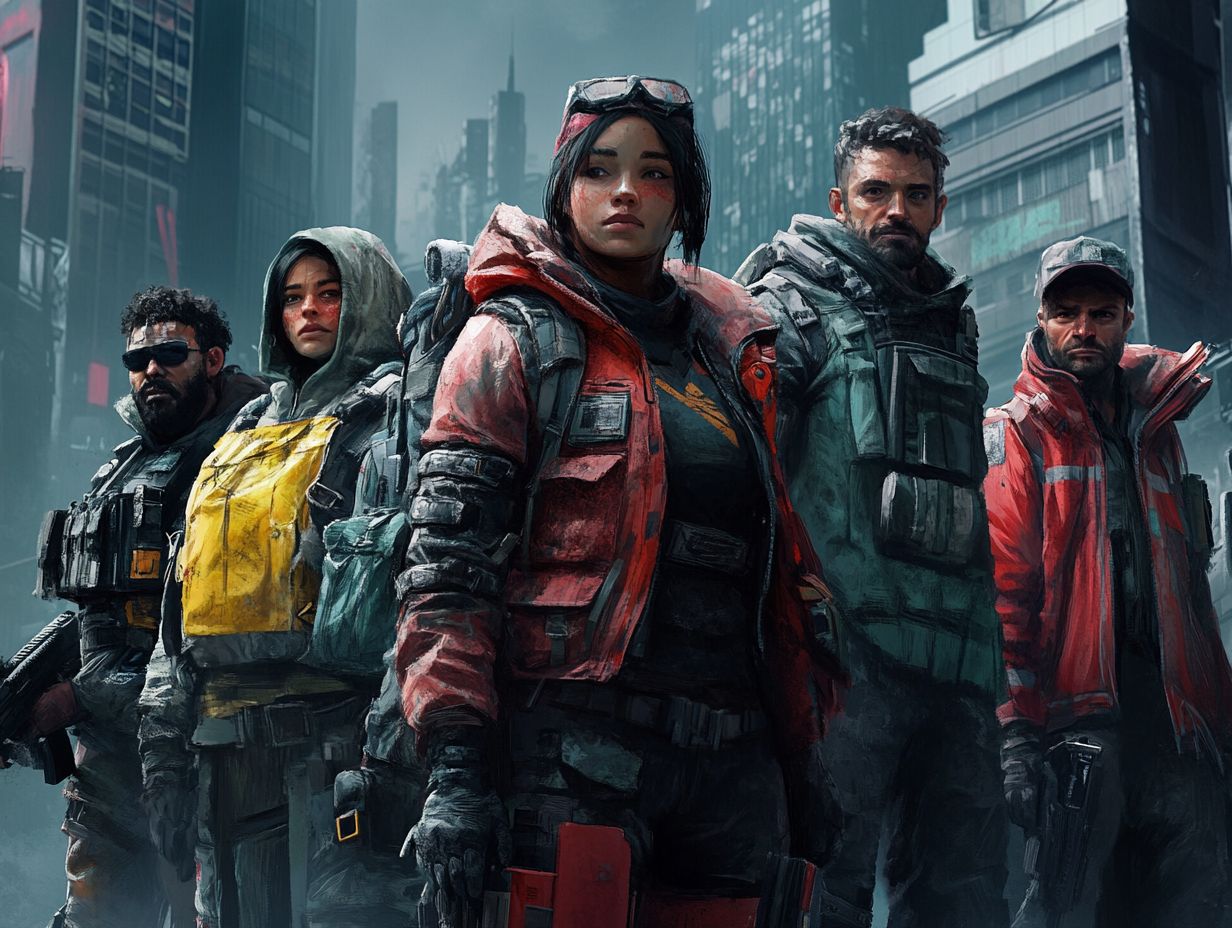Defining Dystopia and its Characteristics

Dystopia is a complex narrative that explores the darkest aspects of society, often depicting a world characterized by oppression, where technology, social organizations, and human relationships have descended into destructive and despairing forms. In these fictional settings, characters confront the consequences of environmental degradation, grapple with moral choices, and strive for self-agency within power dynamics that strip them of control over their lives.
Dystopian literature serves as a critical commentary on modern society, addressing themes such as rebellion against illegitimate authority, the resilience of human nature in the face of inhumanity, and the pervasive fear that envelops societies during troubled times.
Lessons from Fictional Characters
Characters in dystopian fiction impart valuable lessons about resilience and adaptation, showcasing the entire spectrum of human experience in the face of adversity.
Whether they grapple with moral ambiguity, psychological trauma, identity crises, or the challenges of community-building, these characters embody crucial lessons about hope and courage.
Through their journeys, they reveal the complexities of human relationships against the backdrop of societal collapse.
Adapting to a Harsh Environment

In dystopian stories, adapting to a harsh environment is a central theme, as characters rely on resilience and resourcefulness to survive and thrive amid chaos. The ability to devise innovative survival strategies and engage with community support often determines individual outcomes, highlighting the fundamental principle of survival of the fittest.
Throughout these narratives, characters encounter various challenges that test their limits and compel them to adopt unorthodox methods while forming connections with others. They may need to forager for scarce resources, create makeshift tools, or employ clever tactics to outsmart their adversaries. The dynamics of community can vary significantly; some characters choose to unite for support, while others succumb to selfishness and betrayal.
This interplay of cooperation and competition illustrates the complexity of human relationships under pressure and emphasizes the importance of adaptability—not only in developing survival skills but also in navigating the intricate web of social relationships that can either bolster or undermine their collective efforts.
Maintaining Morality and Humanity
In dystopian worlds, preserving morality and humanity becomes challenging as characters confront ethical dilemmas amidst chaos and oppression. The psychological burden they carry often strains their emotional resilience, revealing their character flaws and the various coping mechanisms they employ to maintain their identity in a tumultuous society.
As they grapple with these ethical dilemmas, the stakes compel them to choose between personal survival and moral obligations, creating tension that can lead to profound internal conflict. The moral challenges they encounter also influence their interpersonal relationships, often triggering a ripple effect that tests the integrity of those connections.
Observing a friend descend into despair may spark an ethical confrontation, prompting them to reevaluate their own moral principles and beliefs. Ultimately, the choices they make during these pivotal moments not only highlight their human vulnerabilities but also serve as a testament to the possibility of reclaiming their lost humanity, even in a morally bankrupt world.
Creating and Maintaining Relationships

Creating and maintaining relationships in a dystopian context is fraught with challenges, as characters must navigate complex dynamics of trust and betrayal while forming alliances with allies and managing enemies.
The bonds forged within the community often serve as a lifeline, providing essential emotional connections that are vital for survival. In such harsh environments, every interaction has the potential to tip the balance between hope and despair, illustrating the precarious nature of human connections.
Characters frequently find themselves torn between the desire for companionship and the fear of deception, which can lead to profound moments of vulnerability. These relationships, whether nurtured through shared struggles or tested by external threats, become a crucial aspect of the narrative, emphasizing the necessity of collaboration in overcoming adversity.
As they face trials together, the emotional stakes rise, revealing that trust can be both a treasured asset and a potential downfall. Their experiences within these intricate webs of camaraderie and rivalry vividly illustrate the resilience of the human spirit in the face of overwhelming odds.
Survival Skills for a Dystopian World
Survival skills are essential in a dystopian world, where individuals and communities must rely on innovative strategies and resource management to navigate perilous situations.
The resilience and fortitude of characters are tested as they confront conflict and adversity, highlighting the significance of community relationships and effective conflict resolution in securing their collective survival.
Basic Survival Techniques

Basic survival techniques in a dystopian environment necessitate a strong survival mindset, where resourcefulness and self-preservation become essential for enduring harsh realities. Characters often embody the principles of survival of the fittest by employing strategies that ensure their continued existence, even against overwhelming odds.
To navigate life-threatening situations, individuals must adapt quickly and rely on both natural instincts and learned skills. Foraging for food, constructing makeshift shelters, and identifying safe water sources are fundamental practices that significantly enhance one’s chances of survival against environmental challenges or adversaries.
The psychological aspect of survival cannot be overstated; maintaining a positive mindset and resilience can make the crucial difference between giving up and persevering to find solutions. Additionally, the ability to think creatively in order to devise clever solutions is another vital survival technique.
Those who can think outside the box are often better equipped to withstand adversity, as their capability to generate alternatives can be just as critical as any physical resource.
Building a Community and Finding Resources
Building a community is essential for finding resources in a dystopian world, as cooperation and effective resource allocation are crucial for enhancing survival strategies. The dynamics within a group often determine the success of a community in acquiring vital resources and necessities.
The significance of community building in navigating resource challenges during a dystopian breakdown includes the following aspects:
- Strong community bonds foster relationships in which individuals can share essential skills, tools, and knowledge necessary for survival.
- Clear communication and shared goals promote cooperation, making it easier to share and manage scarce resources effectively.
- Group dynamics play a vital role in maintaining high morale, as community members can provide emotional support to one another during challenging times.
- Cooperative strategies, such as pooling resources or dividing tasks according to individual strengths, enable people to concentrate on the areas where they excel, ultimately improving resource sharing and efficiency.
Preparing for a Dystopian World
Preparing for a dystopian world requires meticulous planning and the cultivation of a flexible survival mindset. This approach equips individuals with the essential supplies and skills needed to navigate uncharted territories.
Adaptability is crucial, as changing situations demand readiness for any outcome.
How to Plan and Prepare for the Worst
Planning and preparing for the worst-case scenario in a dystopian situation involves learning survival tactics and emergency preparedness measures, enabling individuals to respond effectively to a variety of contingencies. The ability to adapt and build resilience in the face of adversity is critical for survival.
Individuals should begin by conducting risk assessments to clearly understand the types of threats they may encounter in their specific circumstances. These risks could include:
- Natural disasters
- Political instability
- Economic collapse
- Societal unrest
A thorough risk assessment allows individuals to prepare for the most likely events and helps them analyze how to respond to threats they may not have previously considered.
Having a comprehensive response plan is essential, including strategies for monitoring and communicating with loved ones and the wider community. Developing a family evacuation plan, establishing a rendezvous point, and knowing how to seek help or resources are crucial for survival in a dystopian society. Emergency response plans should be regularly updated to reflect changing situations or individual circumstances.
Individuals should stockpile essential supplies such as:
- Non-perishable food
- Water
- Medical supplies
- Hygiene products
- Tools
These supplies should be stored in a specific location that is easily accessible during emergencies. It is vital to ensure that the supplies are kept in a safe place, one that is not likely to be adversely affected by natural disasters or societal unrest.
Survival tactics are often not learned until there is an immediate need. To ensure that individuals and families are prepared for the worst-case scenario, they should regularly practice emergency drills. These drills should cover evacuation routes, safety procedures, and communication protocols. Communities and organizations can also conduct drills to enhance their members’ preparedness.
Plus acquiring specific skills, individuals should learn to adjust their expectations and attitudes. In a dystopian situation, individuals may be required to undertake actions they never thought they would have to perform. For instance, someone who has always opposed violence may find themselves needing to protect themselves or their family from threats. Similarly, an individual accustomed to having easy access to food may not know how to find or grow it. Maintaining an adaptable mindset can significantly aid individuals in preparing for the worst-case scenario in a dystopian society.
Training in practical skills is another important way for individuals to prepare. Instruction in first aid, navigation, self-defense, and emergency management can enable individuals to respond effectively in emergencies. Self-defense classes provide opportunities to practice skills with others, while survival courses teach various techniques for different scenarios. First aid training equips individuals with the knowledge to save lives. It is essential for individuals to take this training seriously and to practice their skills regularly, even outside of emergency situations.
Lastly, finding and nurturing a network of like-minded individuals is critical for preparing for the worst-case scenario in a dystopian setting. This involves forming bonds of friendship based on mutual respect and support. Strong community and family ties can serve as a safety net, and their collective strength can help individuals develop the confidence needed to cope with difficult situations. On a broader scale, communities can bolster their networks by offering outreach programs and education that enable individuals to contribute positively to society.
Essential Supplies and Skills to Have
In a dystopian world where resource allocation and self-preservation are crucial for survival, determining the value of supplies and survival skills is essential. Skills such as first aid, foraging, and self-defense, along with community support, can enhance an individual’s adaptability in various situations.
Knowing how to ration scarce supplies is vital, as each item could mean the difference between life and death. Tools for building shelters, methods for cooking with minimal resources, and techniques for purifying or storing water are equally critical for maintaining health and ensuring the safety of one’s home.
Additionally, knowledge of tracking and hunting can provide a consistent source of food when traditional supplies run out. Developing strong community bonds can supplement individual efforts, creating a support network that boosts morale and facilitates skill sharing.
By cultivating both practical skills and the relationships necessary for their implementation, survivalists can effectively confront the challenges they face, establishing the conditions for sustainable living even in the harshest environments.


